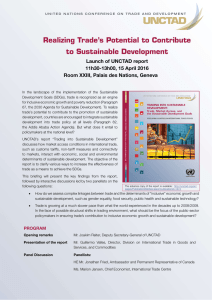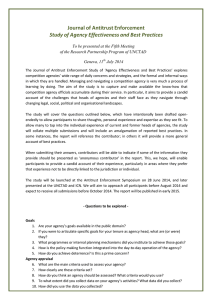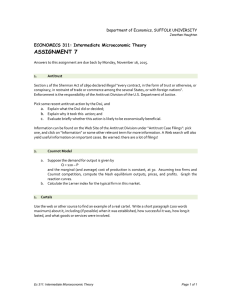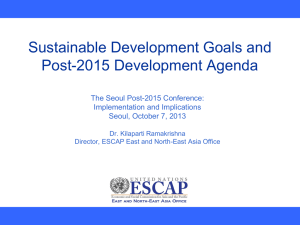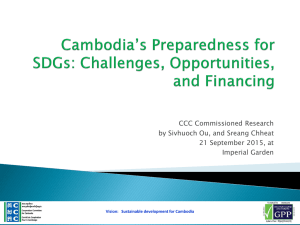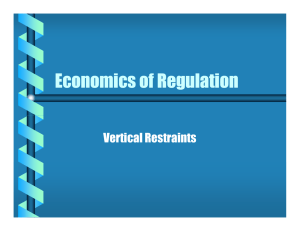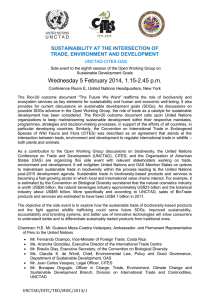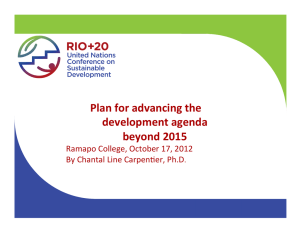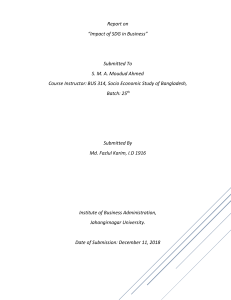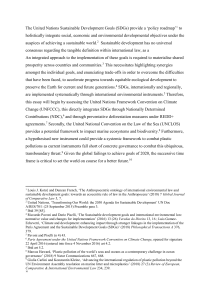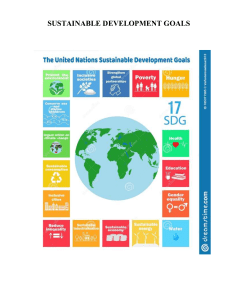Professor Eleanor Fox New York University School of Law
advertisement
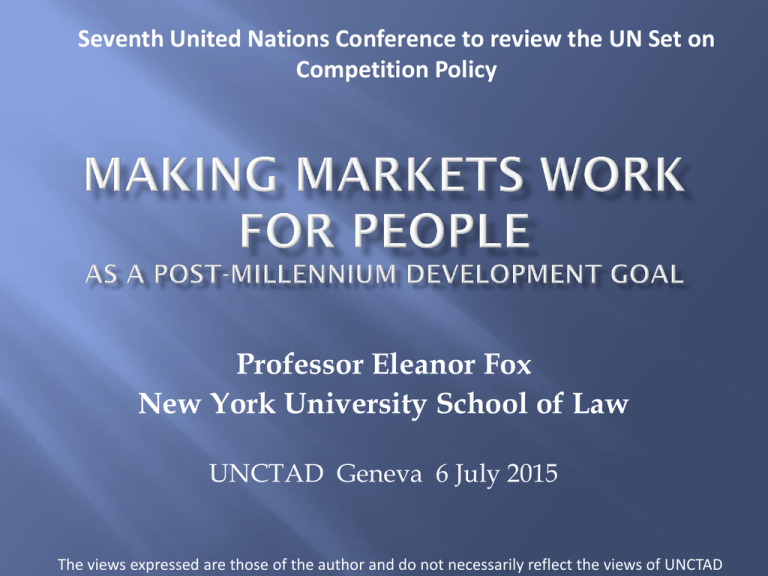
Seventh United Nations Conference to review the UN Set on Competition Policy Professor Eleanor Fox New York University School of Law UNCTAD Geneva 6 July 2015 The views expressed are those of the author and do not necessarily reflect the views of UNCTAD 1 Sustainable and inclusive growth and development – why prioritize sustainable development goals (SDGs) 2 Where do competition law+markets come in? Market access for people without power It should be an SDG 3 Integrating antitrust and the SDGs exemptions, fairness, public interest 4 Conclusion I. More than a billion people still live in extreme poverty. Nearly 1/3 children in developing countries are underweight or stunted. Malnourishment causes severe physical/cognitive damage; impacts productive work force for generations WORLD BANK WORLD BANK A New Vision for Sustainable Development ... A new post-2015 development agenda is being designed. Today’s global realities … require that the proposed agenda be more ambitious and interconnected than its predecessor, with a more comprehensive vision of development ... The proposed SDGs encourage every country to end poverty and enhance social and economic development ... These goals will not be achieved with a business-as-usual approach. Are markets – with competition law – a solution or a problem? 1. Oxfam plus: Markets are the problem “Working for the Few: Political capture and economic inequality” 2014 – markets serve elites 2. Moving past Oxfam Two ways markets are a solution When antitrust might be a problem and step aside (exemptions) 1 The fruits of the market (+ antitrust as needed) Lowering prices, increasing output, variety, innovation (for rich and poor; priorities) 2. The right to be part of the market Right of participation free of unnecessary, exclusionary barriers and restraints, public and private Right of access for freedom, dignity, autonomy, selfsufficiency Freedom to help one’s self and family by own good works Where Amartya Sen, Friedrich Hayek, Hernando de Soto converge For developing countries and others with systemic deep poverty, entrenched skewed inequality, lack of mobility and lack of resources and institutions to satisfy basic human needs and pull people up the opportunity ladder: This means: competition law is not or is not always aggregate wealth law It is outsider law – markets for the people Policing abusive restraints that fence out outsiders Access to markets stands alongside food, nourishment … as an Inclusive Growth and Development goal and tool Once it is understood that markets have great value to sustainable inclusive development 1. Exemptions the question of integration with (other) SDGs takes a different dimension No exemption for economic progress – it is built in The Chicken for Tomorrow and animal welfare 2. Fairness Fair competition Fair bargaining 3. Public interest Jobs and small business South Africa – the market friendly way Do we need exemptions? EU guidelines 78% of world’s poor live in rural areas most are dependent on agriculture; child labor rampant Think positively: How can markets/antitrust help? Improve market access IFAD: Promoting Market Access for the Rural Poor in Order to Achieve the Millennium Development Goals (2003) Antitrust challenges 1. attacking international input cartels 2. protecting from monopsonistic strategies contracts that keep out competitors; oppressive terms; abuse of patent rights; cf. charges against Monsanto 3. protecting against monopsonistic mergers 4. confronting the not-our-problem problem MARKETS EMPOWER PEOPLE MAKING MARKETS WORK FOR PEOPLE WITHOUT POWER DESERVES TO BE A SDG BUT A GREAT MASS OF PEOPLE NEED TO BE CONVINCED THAT MARKETS CAN WORK FOR THE PEOPLE AND NOT FOR AN ELITE EXPLOITING FEW COMPETITION AUTHORITIES CAN BE PART OF THE SOLUTION
